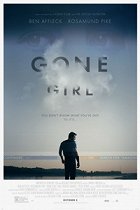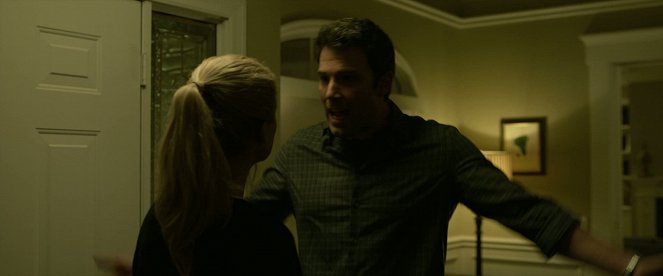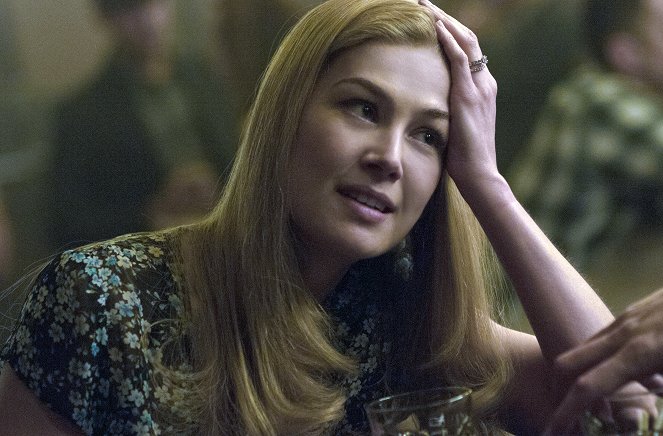Directed by:
David FincherScreenplay:
Gillian FlynnCinematography:
Jeff CronenwethCast:
Ben Affleck, Rosamund Pike, Neil Patrick Harris, Tyler Perry, Carrie Coon, Kim Dickens, Patrick Fugit, David Clennon, Lisa Banes, Missi Pyle, Emily Ratajkowski (more)VOD (2)
Plots(1)
GONE GIRL unearths the secrets at the heart of a modern marriage. On the occasion of his fifth wedding anniversary, Nick Dunne (Ben Affleck) reports that his beautiful wife, Amy (Rosamund Pike), has gone missing. Under pressure from the police and a growing media frenzy, Nick's portrait of a blissful union begins to crumble. Soon his lies, deceits and strange behavior have everyone asking the same dark question: Did Nick Dunne kill his wife? (20th Century Fox)
(more)Videos (2)
Reviews (17)
Like Paul Thomas Anderson, David Fincher is moving toward an increasingly subdued and austere form of perfection in his directing. After the first part of their respective filmographies, which was characterised by ostentatious formal bombast culminating, in Fincher’s case, in Panic Room with abundant playing with flying camerawork in flawless reality-defying approaches, greater efficiency and modesty are increasingly becoming hallmarks of their later films. That doesn’t mean that Fincher and Anderson have become some sort of ascetics, but only that their mastery is reflected in the fact that they do not in any way attract attention to themselves. We could almost mention the return of studio style, where the form also served to maximally draw viewers into the story and did not have to draw attention to itself, except this time it’s not a matter of following certain conventional rules, but expressing flawless familiarisation with the craft and maximally well-though-out composition of every shot so that it serves the work as a whole. Gone Girl is Fincher’s riveting masterclass on outwitting viewers, where at the same time we are astonished not only by the narrative (typically about characters who deceive those around them and inventively work with their own image), but also by how seemingly easily and subtly the film guides us and keeps us chained to the screen and holding our breath throughout its runtime.
()
Bitching about Fincher playing it safe is like badmouthing Jagr for his hockey finesse and scoring goals. This narrative, directed with the precision of a neurosurgeon, for whom the camera is the scalpel and the music the anesthetic, precisely doses the marital crisis with a cool detachment, in which the apparent waters of detachment are navigated by actors who have every letter of the script pinned directly to their bodies. Affleck's worldliness with the hallmark of a small-town dweeb works, but Rosamund Pike reigns supreme. Their interaction is something you experience on screen once or twice every three years. It’s a perfectly polished film that knows it and isn't ashamed of it. The first and last shots are divine.
()
Spoilers ahead. A five-act play about marriage and engaging storytelling. The film not only preserves the book’s “he said/she said” structure, but further thematises the telling of various versions of the same story through words and images. From the storytelling perspective, Gone Girl is notable in both how the film communicates with the viewer and how the individual narrative segments communicate with each other. One gets the impression that the information in Amy’s diary is a response to what Nick is experiencing and vice versa. The diary flashbacks trigger events in the present (the discovery of Amazing Amy’s artifacts) and the returns to the present are handled with fluid graphic transitions (the kiss – wiping of the mouth), thanks to which the shots organically complement each other. As the co-creator of Nick’s story, Amy is thus seemingly present even in scenes in which she does not physically appear (in the book, this impression is achieved through Nick’s feeling that Amy is looking over his shoulder and commenting on the text of the novel that he is writing). Thanks to the “cooperation” between the information from the past and that from the present, both storylines can serve to convey evidence supporting the intensification of the police investigation (which Flynn does not needlessly delay here, making better use of it than in the book to tighten up the narrative). Similar communication takes place at a higher level between the first and second parts of the film. In the second part, there are variations on scenes from the first part, with a different allocation of the roles of prey and predator (first Nick and then Amy suspects that someone is moving around in front of the house) and different motivations for their actions (the goal of “finding Amy” remains, but until the final act, it is not her life that is in danger, but Nick’s). ___ Like the composition of some of the shots, which are terrifying in how inhumanly perfectly centred they are, the similarity of whole scenes is confirmation of Fincher’s obsession with symmetry. Even so, I don’t consider the moral relativism of either the book or the film to be as well-honed as their creators would have liked. Against a sadomasochistic sociopath and murderer stands a rather ordinary guy who “only” lies, treats his own father like shit and has been unfaithful to his wife. ___ I suspect that the negative depiction of the female protagonist was the reason that the book appealed to Fincher. Nevertheless, women who have been betrayed may feel a certain satisfaction from the fact that Amy exclusively uses feminine weapons to symbolically castrate her husband (for which we are prepared by Go’s “Protect Your Nuts” T-shirt in the opening scene). Her power does not consist in thinking and acting like a man. ___ Fincher’s handling of the audio-visual form of every shot is more masterful from film to film. Minor adjustments in colour, pacing and shot size are used to adapt the overall noirish atmosphere with cold colours into a clinical police procedural here, a toxically cynical relationship satire there (along the lines of Who's Afraid of Virginia Woolf?) and even a splatter flick. Instead of switching between thriller, biting social commentary and dark comedy, these individual types are layered on top of each other, so that we can view each scene from multiple (genre) perspectives and admire the precision with which Fincher takes care to ensure that none of the genres dominates and that the viewer cannot experience the satisfaction that comes with the fulfilment of a particular formula. The ending is as unsatisfying (in the sense of not being a typical Hollywood ending) as what the film says about certainty in marriage and honesty in relationships generally. 85%
()
(less)
(more)
When an author adapts his own (so complex) work for the silver screen, it rarely bodes well because there is too much personal involvement. This doesn’t apply to Flynn, who wasn’t afraid of cutting up and changing her "mirror holding, not-so-much-crime-thriller, satirical, cynical bestseller about relationships" to suit the needs of another medium. So she got rid of everything not directly related to the central storyline. Due to this there is drastically less about those two (and so the main snag with the original book, that these two are puppets who behave according to the momentary needs of the story and that they aren’t living characters, becomes much more apparent) and more about the investigation storyline and the influence of the media on public opinion. And so the movie did include Nick’s unfulfilled ambitions as a writer and Amy’s magazine quizzes in everyday practice. Even the diary entries are edited to the bare minimum; it’s simply whittled down to a stump. And as much as this approach didn’t work in the book, the better it works on the movie screen; especially Fincher’s so apt, coolly depersonalized concept which is taken a level higher by the disquieting hypnotic background music from the Reznor/Ross duo. In any case, the most important parts of the book remained. The evolution of the Nick/Amy relationship is cleverly written, like the best horoscopes. I mean in a way that any couple in a long term relationship can recognize themselves in some respect (I’m talking about the first half here). And in this situation you might take it personally, because this creates the impression that "this could happen to you too". If it isn’t happening already...
()
Gone Girl is a really good atmospheric drama, the kind probably only David Fincher can make. But that’s my problem – whenever I see Fincher and a thriller, I expect something in the vein of Seven. But as opposed to this flick, everything about Seven was perfect. In this case, the movie is close to perfect, which is also why I was originally going to give it a five-star review. But as time went on, I decided to take one star off because there were things in the movie that messed up the perfection. Take for instance Neil Patrick Harris. His character was good, but I’d never cast him into a serious thriller like this. He simply doesn’t belong into movies like that, no matter how hard he tries. You may have noticed that nobody even mentions him here. By contrast, Rosamund Pike puts in a performance that will be really hard to ever to surpass for her. I hadn’t seen such a good performance in a long time and I will not forget it any time soon, if ever. Despite her perfect performance, you still have Ben Affleck, about whom I really don’t know what to think. I definitely wouldn’t say he’s stiff, which is what a lot of people here are saying, I simply didn’t know where to put him. It seemed to me he had no opinions of his own and I still feel the same way. Well, and these three actors portray probably the three most important characters in the movie. And that’s where it all starts from and also what it lives and dies with. As regards the story, it’s absolutely clear to me why Fincher had picked it. The same way it was clear to me why he’d picked the ‘Millennium Trilogy’. It’s obvious that he likes stories like these. He simply loves the unexpected twists. Let me just add that this movie didn’t get five stars because the ending was cut off unnecessarily fast. I would have expected some kind of conclusion that would knock me off my feet and that I could keep thinking about without having to get back to the movie as a whole. Simply some knock-out ending. Something similar to what you get in Shutter Island. Unfortunately, that didn’t happen, hence the four-star review. At the same time, I think that it is one of the best movies Fincher has ever made. If he just went on making movies like this, I wouldn’t mind at all.
()



Ads